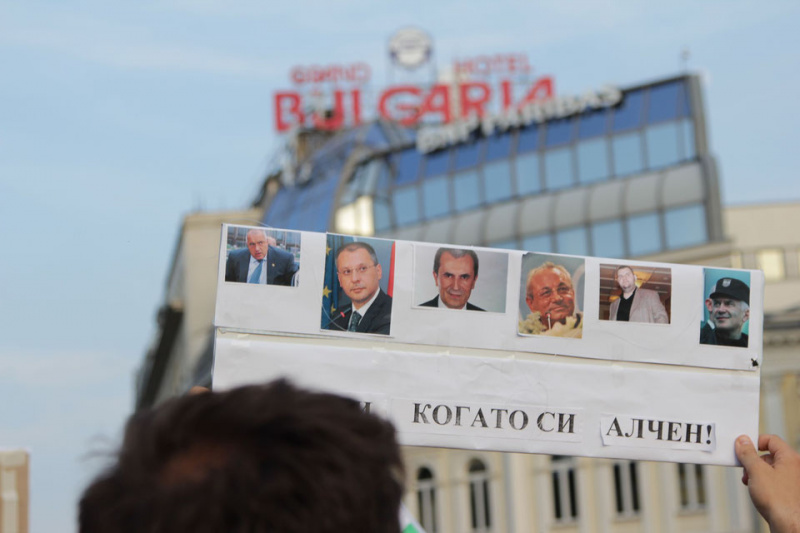Media Fixer in Bulgaria
Politicians? No, Oligarchs Rule Bulgaria

A file photo shows an anti-governmental protestor carrying a poster, reading “You are not yourself when you are greedy”. Photo by Dimiter Muftieff
Nothing happens quickly in Bulgaria. Except when oligarchs clinch shady deals or fall out and seek revenge.
Bulgaria's tobacco monopoly Bulgartabac is a major case in point.
True, shady dealings over its sale have been a public secret for years, but Bulgaria's recent murky bank runs and the dramatic collapse of Corpbank revealed even more dirty secrets.
The Hurried Sale
In the middle of September 2011 the thirteen-year-long labours of four governments to sell Bulgaria's cigarette maker Bulgartabac delivered a head-spinning result at a head-spinning speed. Bulgaria's privatisation agency sealed the deal to sell the company to a unit of Russia's VTB Bank to a virtually anonymous buyer and even before the Commission for Protection of Competition delivered its ruling.
Unfortunately, it was not only the speed that made analysts and workers at the plant scratch their heads and also bang them on the table.
Obviously, with elections just around the corner at that time, time was running out for political friends and foes to form new informal coalitions and forge new allegiances. The ethnic Turkish Movement for Rights and Freedoms emerged as a key conductor, orchestrating the maneuvers. As usual.
Back in February 2005, the Turkish minority triggered a political storm by flopping Bulgartabac sell-off deal and prompting a non-confidence motion against the government of Simeon Saxe-Coburg. Back then international observers commented that the political storm, unleashed by the flopped sale of the tobacco monopoly can be taken for a sign of a mature democratic system.
It is ironic that six years later, the successful privatization of the company came only as a sign of the lack of a democratic system in Bulgaria, not to mention a mature one.
Because this deal proved beyond any doubt that there are no political parties in Bulgaria, only vested interests.
The privatisation of the cigarette maker failed in previous years due to political wrangling and pressure from the ethnic Turkish party. Interestingly, in 2011, even though the party was not in power, it did not object to the sale.
Apparently a new and until then unthinkable political coalition between the ethnic Turkish Movement for Rights and Freedoms, the Bulgarian Socialist Party and the centrist party of Simeon Saxe-Coburg, had been forged only to be blessed by the then ruling GERB party and Prime Minister Boyko Borisov.
This fact, coupled with the anonymity of the buyer, a network of offshore companies, hidden behind the Russian bank, only fuelled speculations that the stakes are much higher.
In the meantime strategic investors were driven away with a set of crazy requirements.
This is how the most difficult and politically sensitive privatization deal of Bulgaria's transition suddenly turned very easy. After thirteen years of failed efforts, it took the state just one week to receive and approve the offer of the sole bidder, and then sign the contract.
The anonymity of the buyer – kept with the utmost care – was another key issue.
It was only 24 Hours Daily, which dared to call a spade a spade, pointing out Bulgaria's Corporate Commercial Bank, linked to Russia's VTB, as the mysterious buyer.
Of Bulgartabac and Corpbank
Corporate Commercial Bank is now left in tatters and threatens to undermine the financial stability of the country.
It is not longer a secret that the bank financed the media group of mogul and ethnic Turkish MP Delyan Peevski, which turned into a monopolist on the market and fawned on the rulers.
But that was the lesser evil, believe me.
The bank's money was used not only for crediting a media empire, but also for funding privatization deals – including Bulgartabac sale - which benefit certain persons, who share the same interests.
Let me stress once again – the people who benefited from this scheme are not people who share one and the same party allegiance, these are people who share one and the same interests.
The politicians did so that the money of state-owned companies is deposited in Corpbank, in return the bank did them personal favors.
The attack on Corpbank has been a finely orchestrated and well planned campaign. The strongest weapon used – the prosecutor's office and the media.
True, the whole situation spiraled out of control, but my opinion is that this won't stop the masterminds from moving ahead with their plans without thinking about the consequences.
They just don't want to pay off the loans they took to buy and siphon off huge state-owned companies, such as Bulgartabac.
How will this madness end?
If history repeats itself, former and probably future Prime Minister Boyko Borisov will come out of the crisis stronger than before, the right-wing opposition supporters will feel betrayed, while the continent's most successful Muslim politician, the leader of the ethnic Turkish party Ahmed Dogan will prove yet again he excels as Bulgaria's back seat ruler.